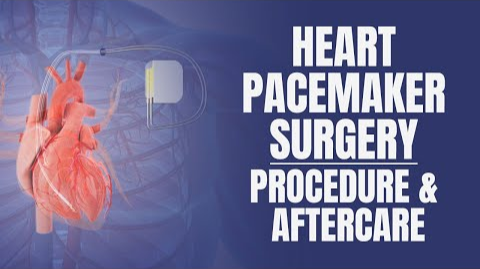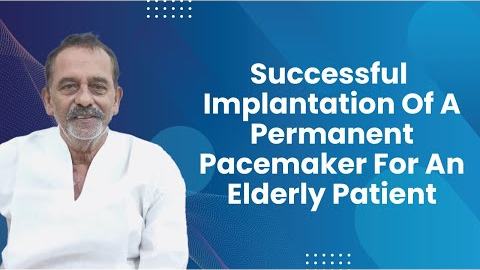What is Pacemaker Implantation?
Pacemaker implantation is a surgical procedure in which a small medical device called a pacemaker is placed under the skin of the chest to regulate abnormal heart rhythms. It sends electrical impulses to the heart when it beats too slowly or irregularly.
This surgery helps patients with arrhythmias, heart block, or heart failure lead a more active and healthier life. By restoring proper rhythm, a pacemaker allows patients to live more actively, reduce symptoms such as dizziness or fatigue, and improve overall heart function.
Types of Pacemaker Implantation
Pacemaker procedures are chosen depending on the patient's heart condition and lifestyle needs. Each type of pacemaker serves a specific role in helping the heart function more effectively:
- Permanent Pacemaker Implantation: This is the most common type, designed for long-term use. The device is placed beneath the skin of the chest and continuously monitors and regulates the heartbeat.
- Temporary Pacemaker Implantation: A short-term device used in emergencies or before permanent implantation. Once the patient's condition improves or a long-term plan is established, the temporary pacemaker can be removed.
- Single-Chamber Pacemaker: Sends electrical pulses to one chamber of the heart (usually the right ventricle). While effective, it may not be suitable for patients who need more synchronised heart function.
- Dual-Chamber Pacemaker: Connects to both the right atrium and ventricle, improving heart coordination. This type of pacemaker more closely mimics the heart's natural rhythm and is often recommended for patients with advanced conduction issues.
- Biventricular Pacemaker (CRT Device): Also known as cardiac resynchronization therapy (CRT), this device is used in patients with severe heart failure. This synchronization improves the efficiency of the heart's pumping action, reduces symptoms of heart failure, and enhances quality of life for patients with advanced disease.
1-2 Hours
Surgery Duration
Local Anesthesia
Anesthesia Used
4-6 Weeks
Full Recovery Timeline

When is Pacemaker Implantation Recommended?
Pacemaker implantation surgery is recommended when the heart's natural rhythm becomes too slow, irregular, or uncoordinated to maintain proper circulation. Doctors evaluate a patient's symptoms, test results, and overall health before deciding on the need for surgery. Below are the common conditions where a pacemaker is advised:
- Bradycardia (slow heart rate): When the heart beats unusually slow, it may not pump enough blood to meet the body's needs. This can cause symptoms such as fatigue, dizziness, shortness of breath, or fainting. A pacemaker helps regulate the rhythm, ensuring a steady and safe heart rate.
- Heart block (signal transmission issues): In heart block, the electrical signals that travel from the upper chambers (atria) to the lower chambers (ventricles) are delayed or blocked. This disruption can lead to skipped beats or dangerously slow rhythms. A pacemaker bypasses the faulty signal pathway and restores normal conduction.
- Atrial fibrillation with slow ventricular response: Some patients with atrial fibrillation develop an irregular rhythm that also slows the heartbeat too much. When this occurs, the heart cannot pump efficiently, which increases the risk of tiredness and reduced activity tolerance. Pacemakers stabilise the ventricular rate, helping improve energy and quality of life.
- Heart failure requiring cardiac resynchronisation therapy (CRT): In certain cases of heart failure, the heart's left and right chambers do not contract in sync, which further weakens pumping ability. Cardiac resynchronisation therapy uses a specialised pacemaker to coordinate contractions, improving circulation and reducing heart failure symptoms.
- Syncope (fainting spells due to irregular heartbeat): Fainting spells may result from pauses or sudden drops in heart rate. If testing confirms these episodes are due to rhythm disturbances, a pacemaker can prevent dangerous slowdowns, protecting patients from falls and injuries linked to sudden blackouts.
How to Prepare for Pacemaker Implant Surgery?
Proper preparation plays a key role in ensuring that pacemaker surgery and recovery go smoothly. Both medical evaluations and lifestyle changes can help reduce risks and support healing after the procedure.
Below is a detailed guide on what patients can expect and how to get ready:
Medical Evaluation & Tests
- Before surgery, doctors usually recommend a series of diagnostic tests. Tests include, ECG to study the heart's rhythm, an Echocardiogram to assess the heart's structure and pumping function. Chest X-ray to review lung and chest health, Blood tests to check for infections, anemia, or clotting issues.
- These evaluations help the medical team create a safe surgical plan tailored to the patient's condition.
Lifestyle Adjustments Before Surgery
- Quitting smoking and avoiding alcohol for at least 1-2 weeks before surgery can significantly improve healing and reduce anesthesia-related risks.
- Inform your doctor about all medicines, especially blood thinners, as these may need to be paused or adjusted to prevent bleeding complications during surgery.
Home Preparation
- Since recovery after a pacemaker implant requires rest and limited movement, arranging support at home is essential.
- Patients should plan for a friend or family member to help with daily tasks such as cooking, lifting objects, or driving.
- Avoiding strenuous activities, especially heavy lifting or reaching overhead, is crucial during the first few weeks.
Day Before & Day of Surgery
- The day before surgery, patients are usually asked to follow fasting instructions, which often means avoiding food and drink for several hours before the procedure.
- On the day of the surgery, wearing loose-fitting, front-opening clothing can make changing and dressing easier after the operation.
What Happens During Pacemaker Implantation Surgery?
Pacemaker implantation is a minimally invasive procedure done under local anesthesia. The procedure is carried out in a specialized cardiac operating room or catheterization lab, where advanced imaging helps guide the placement of the device.
Preparation & Anesthesia
- Before the surgery begins, the chest area is carefully cleaned and sterilized to reduce the risk of infection.
- Local anesthesia is applied near the collarbone to numb the site, and sedation may be given through an IV to keep the patient calm. Vital signs are continuously monitored throughout the procedure.
Incision / Access Point
- A small incision is made near the collarbone, usually around two to three inches long.
- Through this incision, the surgeon gains access to the large vein that leads directly to the heart. This approach allows the pacemaker leads to be guided safely into position.
Lead Placement
- One or more thin, flexible wires called leads are carefully threaded through the vein into the appropriate chambers of the heart.
- Using X-ray guidance, the surgeon ensures that the leads are secured in the correct location.
- Once in place, the leads are tested to confirm they can deliver reliable electrical signals to regulate the heartbeat.
Pacemaker Placement
- After the leads are properly positioned, the pacemaker device, a small, battery-powered unit, is inserted under the skin in the upper chest.
- It is usually placed in a pocket of tissue created by the surgeon just below the collarbone.
- The leads are then connected to the device, completing the system that helps control the heart rhythm.
Testing & Closure
- Before finishing, the surgeon programs the pacemaker and tests it to make sure it responds correctly to the patient's heart rhythm.
- Once confirmed, the incision is closed with stitches or surgical glue. A sterile dressing is applied, and the patient is moved to recovery for monitoring.
Medical Professionals Involved in Pacemaker Implantation and Treatment
Pacemaker implantation and treatment are typically managed by medical professionals specializing in cardiology and cardiac electrophysiology. These experts collaborate to evaluate, diagnose, and provide comprehensive care for individuals requiring pacemaker implantation.
Here's an overview of the critical medical professionals involved:
- Cardiologist: A doctor specializing in diagnosing and treating heart conditions. They oversee the overall heart health and determine if a pacemaker is necessary.
- Cardiac Electrophysiologist: A cardiologist with specialized training in heart rhythms, they are responsible for implanting and programming the pacemaker.
- Cardiothoracic Surgeon: A surgeon specializing in heart and chest surgery, involved in any surgical procedure needed alongside the pacemaker implantation.
- Anesthesiologist: A medical professional who administers anesthesia during the procedure to ensure comfort and safety.
- Cardiac Nurses: ;Nurses with specialized training in heart care, assisting with preoperative, perioperative, and postoperative care.
- Technicians: Specialists responsible for preparing equipment and supporting medical professionals during the procedure.
- Radiologic Technicians: Healthcare workers skilled in operating imaging equipment, used during the procedure to guide the placement of the pacemaker.
What to Expect After Pacemaker Implant Surgery?
Recovery after pacemaker surgery is generally smoother and faster compared to other heart procedures. Most patients spend one night in the hospital for observation, although some may be discharged the same day if the implantation was straightforward.
First Few Days
- In the initial days after surgery, mild discomfort, swelling, or bruising around the incision site is common.
- Patients may notice some stiffness in the shoulder and upper chest on the side of the pacemaker.
- Doctors often recommend avoiding sudden arm movements or heavy lifting during this period to allow the leads to settle securely.
Weeks 2-4
- By the second week, most patients begin feeling more comfortable. Light daily activities can be resumed, such as walking, reading, and desk work.
- However, activities that involve stretching the arm above the shoulder or carrying heavy items should still be avoided.
- This helps protect the incision and prevents accidental displacement of the pacemaker leads.
Weeks 5-6
- At this stage, healing is usually well underway, and many patients are able to return to work and gradually resume normal routines.
- Physical activities can be reintroduced, but they should be increased slowly and with the guidance of a healthcare provider.
- Regular follow-up appointments are important to check pacemaker function and ensure that the device settings are working optimally.
3-6 Months
- Within three to six months, the pacemaker site is typically fully healed. Most patients no longer experience soreness and can return to all regular activities, including exercise, driving, and travel.
- The long-term benefits of the pacemaker, such as reduced symptoms of dizziness, fatigue, or fainting, become more noticeable as the heart rhythm stabilizes.
Doctor's Tip:
Avoid rubbing your eyes after PRK. Use eye drops regularly as advised to prevent dryness and speed up healing.
Benefits of Pacemaker Implantation
Pacemaker surgery provides several life-changing advantages that go far beyond restoring heart rhythm:
- Restores and regulates heart rhythm: A pacemaker ensures that the heart beats at a steady and appropriate rate. This prevents sudden pauses or dangerously slow heartbeats, which are common causes of fainting spells and unexpected collapses.
- Reduces troubling symptoms: Many patients with abnormal heart rhythms experience fatigue, dizziness, or shortness of breath. By stabilizing the heartbeat, a pacemaker helps ease these symptoms, allowing patients to carry out daily activities with greater energy and comfort.
- Improves overall heart function: A steady rhythm helps the heart pump blood more effectively to the body and brain. This improvement supports organ health, reduces strain on the heart, and enhances endurance during physical activities.
- Enhances quality and longevity of life: With the correction of dangerous rhythm disturbances, patients often experience a new level of independence. A pacemaker allows them to live longer, healthier lives, with fewer restrictions on activity and improved confidence in their overall well-being.
Risks of Pacemaker Implantation
Although pacemaker surgery is considered a safe and routine procedure, there are still certain risks that patients should be aware of:
- Infection at the implant site: Like any surgical procedure, there is a risk of infection at the site where the pacemaker is placed. Most infections are treatable with antibiotics, but in rare cases, the device may need to be removed and replaced.
- Bleeding or bruising around the surgical area: Minor bleeding and bruising are common immediately after surgery, especially in patients on blood-thinning medications. These usually resolve with time but may require medical attention if excessive.
- Lead displacement or movement: The thin wires (leads) that connect the pacemaker to the heart can occasionally shift out of place. If this happens, the device may not work correctly and may require adjustment or repositioning.
- Pneumothorax (air leakage around the lungs): During the placement of leads near the chest, there is a small chance of accidental air leakage around the lungs. This condition may cause chest pain or shortness of breath and typically needs medical management.
- Device malfunction (rare complication): Pacemakers are highly reliable, but like any electronic device, there is a very small risk of malfunction. This can involve battery issues, electrical failure, or lead problems. Regular follow-ups and device checks help prevent serious complications.
Pacemaker Implantation Surgery Cost in India
The cost of pacemaker implantation surgery in India depends on the type of pacemaker, the surgeon's expertise, and the hospital facilities.
On average, it ranges between Rs. 80,000 to Rs. 2,50,000. For accurate pricing, please call our Medicover Hospital's customer support team.






























